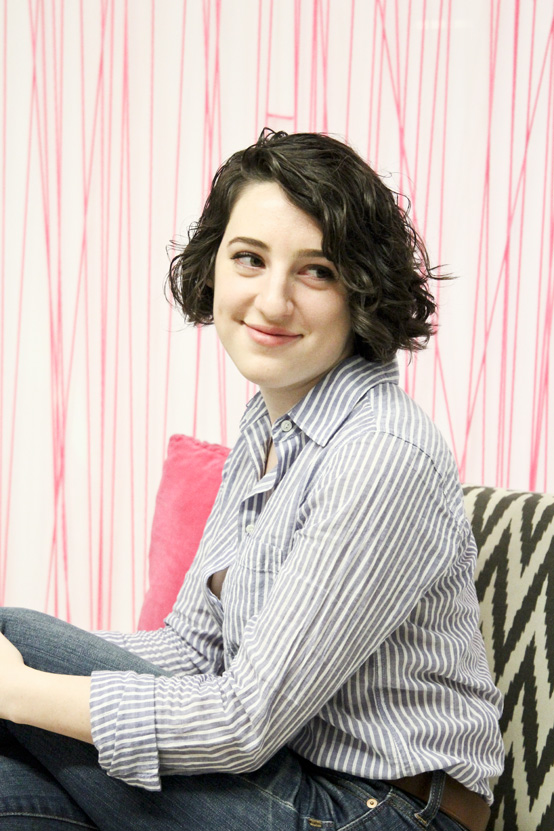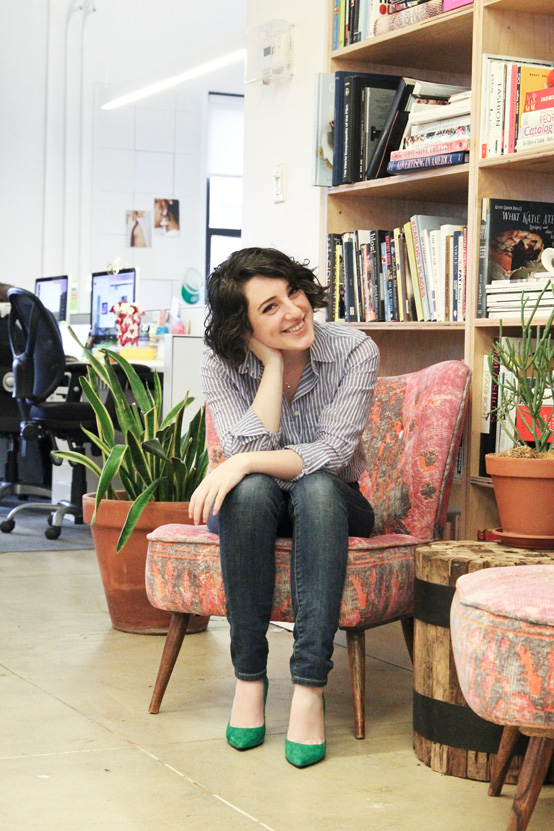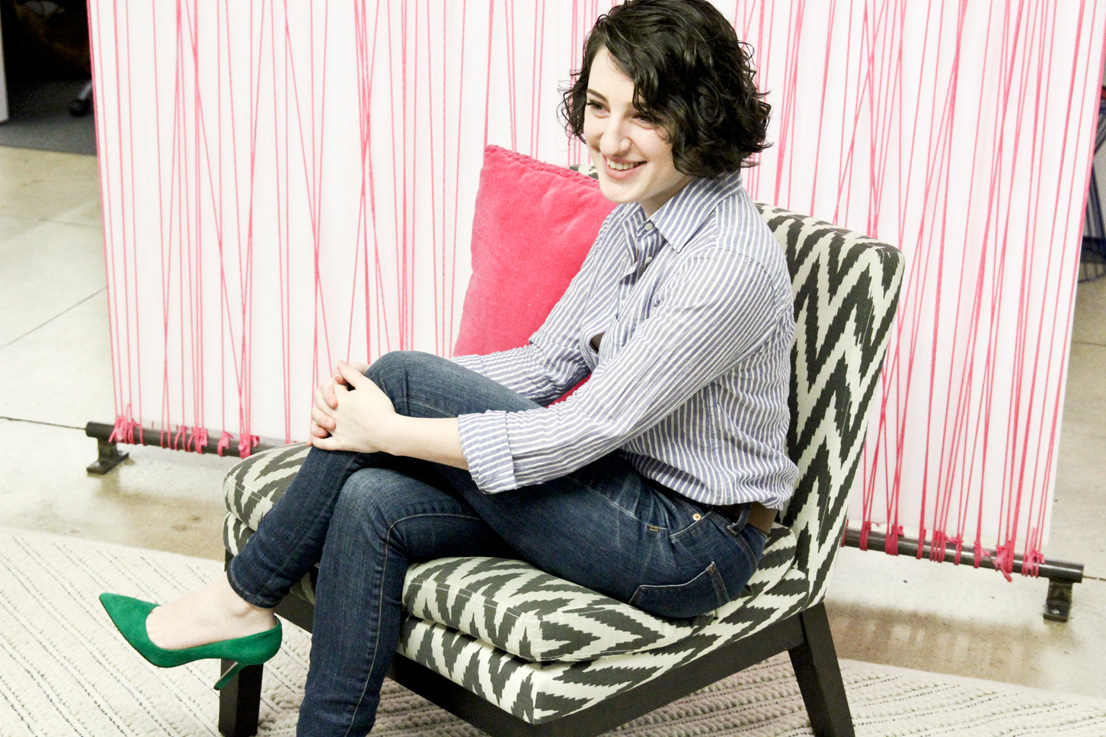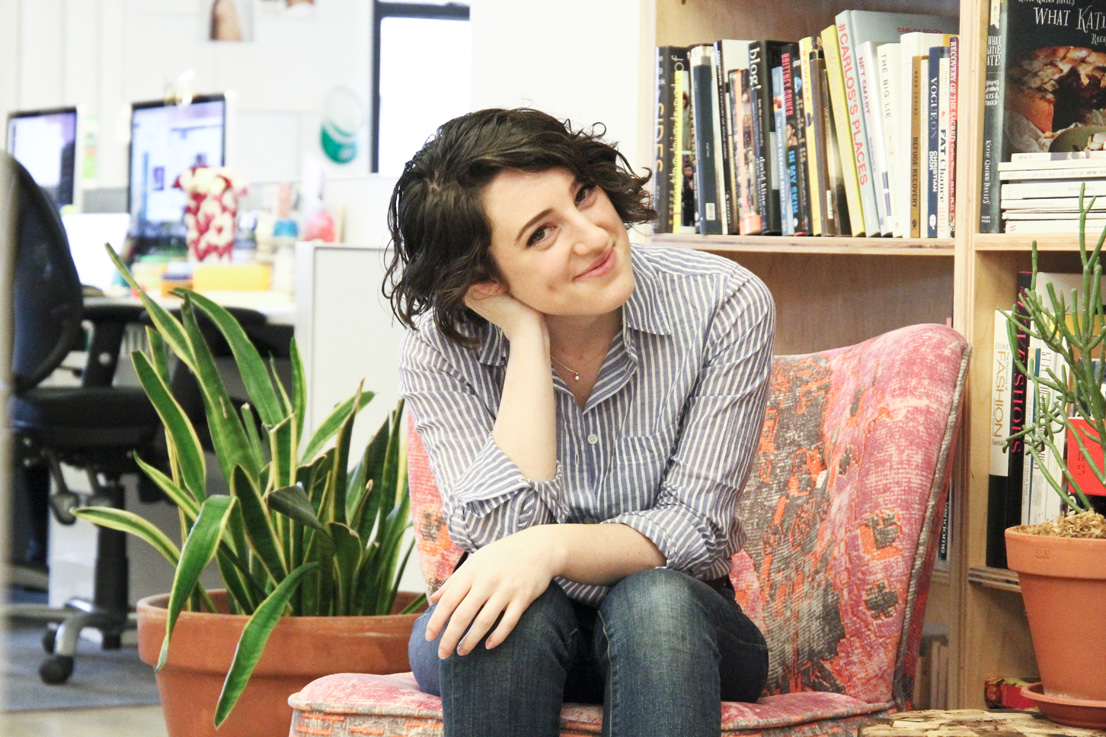Between our career profiles, wellness interviews and wardrobe snooping, we get to meet some truly inspiring people doing what we do. And naturally, we like to quiz them on a whole manner of things: from their favourite new workout to that cult beauty product we need to get on board with. But more than anything, it’s their career journeys that we love hearing about most. Refinery29 is always a first port of call for us here at The Lifestyle Edit, so when we had the chance to sit down and do just that with their social media editor, Julie Bogen, unsurprisingly we quizzed her about everything. Mostly, about how she’s managed to quickly climb up the ranks to just shy of two years after graduating. Oh, and the fact that she had amassed an enviable portfolio of writing clippings for the likes of Teen Vogue and Oribe while interning no less.
It’s hard enough just managing our own social media account but at Refinery29, Julie has the task of making sure their platforms are looking good, and the content constantly evolving. As social strategy planner, she spends her day dreaming up audience-growth concepts, creating best practices for her team to implement and always has one ear to the ground about where social and digital is heading.
In a nutshell, she’s impressive. Not in that intangible way that feels far removed from where you are now – her story is utterly relatable. As someone in her mid-twenties, she living proof that if you knuckle down, learn fast and are truly passionate about what you’re putting out there, anything is possible. If you’re career resolutions for the year have officially fallen by the wayside by now, consider this as a much-needed dose of inspiration to get back on track. Whether you’re starting out as a writer and don’t know where to start, want to know how to get that next promotion or suffer from imposter syndrome and self-doubt, she’s been there, done it and has the words of wisdom you need to hear. We’ll let her take it from here…
[show_shopthepost_widget id=”1449403″]
I majored in Film & New Media Studies and minored in Journalism and Spanish at Wheaton College in Norton, MA. I was drawn to Film & New Media studies because, at its core, it was about reading and writing, but honed skills that were valuable and marketable in a developing media industry — programming, visual design, storytelling, and video producing. My Spanish minor was earned almost completely during my semester abroad in Spain, and Journalism allowed me to explore the more niche side of the editorial industry like ethics and style guides. It also required that I complete at least one editorial internship for a minimum of six weeks, which was especially valuable since many high-profile publications require that you can earn academic credit.
I’ve been writing and reading magazines for as long as I can remember. I had one teacher when I was around 10 years old, and I’ll never forget her gifting me an empty journal saying, “I am so proud of you, and you are so passionate. Use this to follow your dreams!” and I did. I think I still have the journal in my attic somewhere. Of course, I went through a phase after seeing Legally Blonde where I wanted to be a Harvard-educated lawyer, but that didn’t last long. My Dad always subscribed to newspapers, so they were around, but I was hooked on Teen Vogue, Seventeen, and then eventually Glamour, Marie Claire, New York Magazine and obviously Refinery29. I read the New York Times occasionally and it was a huge inspiration in the way I thought about framing a story with headlines. I definitely think those publications helped develop the voice in which I write — ideally, on a good day: like a silly, intelligent woman speaking to other silly, intelligent women.
I interned during the summer in between my junior and senior year at Wheaton. The summer before, I had worked as an editorial intern for The Litchfield County Times and Passport Magazine, and they gave me a ton of independence to pitch and write. One of my stories was a feature on beauty power couple Daniel Kaner, co-founder of Oribe Hair Care, and makeup artist and designer, Sonia Kashuk. I was in touch with their now-former Executive Director of Content, Lori Erlich (formerly Morris), throughout the process, and she offered me an internship at Oribe’s NYC headquarters the following summer. In terms of my time at Teen Vogue, I had been interning remotely for the now-shuttered I Like What You’re Wearing while studying abroad in Spain. When the publication closed its doors, Editorial Director Jessica Pels (formerly Duncan), took the Features Editor job at Teen Vogue. She and I had really clicked, so when she invited me to be her intern for the summer, I was over the moon. Both opportunities (Oribe & Teen Vogue) were so valuable and formative that I couldn’t bear to choose one over the other. Luckily, Lori and Jess agreed to split me. It was, to date, the best summer of my life.
 I think a big part of earning responsibility and trust is starting small. Because I started by working for a local publication with limited resources, there was an actual demand for me to contribute. I took initiative, presented well-researched ideas, and worked really hard to present excellent content. By the time I left The Litchfield County Times, I had a portfolio that included both cover stories and news pieces, as well as a stellar recommendation from my supervisor. My bosses at Oribe and Teen Vogue saw the clips and knew I was careful and capable, so they felt comfortable assigning out stories. Now, many young professionals look for the big names, rather than the best experience, but I definitely owe my writing exposure to the latter.
I think a big part of earning responsibility and trust is starting small. Because I started by working for a local publication with limited resources, there was an actual demand for me to contribute. I took initiative, presented well-researched ideas, and worked really hard to present excellent content. By the time I left The Litchfield County Times, I had a portfolio that included both cover stories and news pieces, as well as a stellar recommendation from my supervisor. My bosses at Oribe and Teen Vogue saw the clips and knew I was careful and capable, so they felt comfortable assigning out stories. Now, many young professionals look for the big names, rather than the best experience, but I definitely owe my writing exposure to the latter.
As far as developing your writing style is concerned, I would say to write like you speak, but nix the “ums,” “likes,” and slang. Whether I’m writing for my own Twitter, working on posts for Refinery29, or blogging for The Petite Prepster, I want people to hear my voice in my words. The best way to do that is to actually sound like myself! It sounds obvious, but sometimes I’ll re-read something and realize I sound like an android. I have a glass of wine, decompress, and then come back to it when I’m feeling more relaxed and creative. Certain things about writing and social media have always come easily to me, but as a whole it’s something I love because it never stops being a challenge. I think a lot of people see writing as an outlet, which it is, but I also see it as an opportunity to learn, read, and grow. You have to research new fields and absorb new information. With social media, it’s the same thing. The audience is never satiated or stagnant, and it’s fascinating to keep up with their passions and priorities.
My contacts were probably the most important thing about the few months I spent as a freelancer. I was still a college student, so I didn’t have the time to write on command, but my network vouched for my work ethic and skill, as well as put me in touch with the right people who were looking for someone with my schedule and qualifications. Of course, a strong portfolio is great, but having someone who can say “I trust this girl and what she’s capable of” gives you an advantage. When pitching, I think it’s important to ask yourself: why does this pitch or potential story matter? Is it going to move people? Is it educational in some way? Will it help anyone? People respond to those things, and no professional appreciates having their time wasted by someone who’s just being self-indulgent. Do your best to find the email address of the editor whose section would run the story, or check the website for a submissions email address.
I first learned about Refinery29 from my former boss at Teen Vogue. One of my responsibilities as an intern was a daily rundown of the news, and she suggested I check Refinery29 for the latest in fashion, beauty, and culture. I’ve been a loyal fan ever since! I always pictured myself in print, but getting a job here changed my life, and I’m so grateful to be a part of something so dynamic and respected.
Writing for social is different than writing traditional online pieces because you have such a limited timeframe and area in which to capture your audience’s attention. Someone seeking out an article likely has some time, but someone skimming through a news feed — whether it’s on Facebook, Twitter, or Pinterest — is only giving a second’s thought to each post. The similarities lie in the fact that people are looking for something that jumps out at them and something they care about. It’s all about finding that sweet spot.
Something that I think helped set me apart when I went for my job at Refinery29 was my enthusiasm. I came early, stayed late, took on my boss’ overflow work, and never complained. I loved what I was doing and wanted to make that clear. I also established a habit early on of asking my boss and team if there was anything I could do before I left work that day. Unless I’m on a hard deadline to get out of the office, I still check. My interview process included more than one round of interviews and an edit test. I think it helped that I was familiar with the brand and had a strong liberal arts background. When you can write, edit, think critically, push yourself creatively, and work in a complex environment, you’ve got a better shot at whatever you do.
When I came on as an assistant at Refinery29, I was really focused on supporting our Director and other editors in managing Facebook and Pinterest. I was an occasional weekend editor — balancing Facebook, Pinterest, and Twitter — and I also did a ton of competitive audits and pivoting. I learned a lot about the strategy behind scheduling, in addition to what our audience responds to and what they want more of. It led to the revamp of our Pinterest strategy and a new appreciation for the platform. In general, Refinery29 really invests in their employees and wants them to succeed. They encourage open channels of communication, opportunities to challenge yourself and grow, and they reward entrepreneurial behaviour in trying different things. My promotions were a really wonderful reward for me taking the initiative to fill open holes. When my former boss moved on to another opportunity, I was able to take on some of her responsibilities. When we verticalized by platform, I was able to exercise independence and experimentation. And, I have to give credit to being surrounded by brilliant, hard-working, passionate people all day long. My co-workers make me want to be better. I can’t stress enough the importance of being in an environment that pushes you to improve and give it all you’ve got.
The ever-evolving space of social media means that I always need to be open to new ideas. I’m constantly looking for innovation inspiration in stories, people, and culture as a whole. And I think that as my role evolves, the stakes will be higher, and I’ll have to really challenge myself to look beyond my usual resources and interests. I’m always pleasantly surprised by the ways I can learn from industries and environments that have seemingly nothing to do with my current position.
One of the things I like best about my role right now is that there’s not always a typical day. I start each morning and end each night with email, and pepper in the rest of my day with planning our social strategy, collaborating with our outstanding marketing team who advises on goals and insights, attending meetings with verticals and production teams, brainstorming new initiatives and stories, and packaging content across platforms. I love pressure. The busiest days at Refinery29 are my favourites because it means I’m never doing the same thing for too long. Not to mention that it encourages me to be hyper-organized. Everything, and I mean everything, is in my calendar, and that calendar runs almost nonstop from 10:00 AM until 6:30 PM. It’s really exhilarating!
I think my parents think I just sit on Facebook all day, and that when people hear “social media” they assume it’s all shallow silliness. In reality, social is about acting as a strategist and gatekeeper for both the content and audience. I spend several hours a day with my team packaging and developing content for optimal performance, brainstorming new initiatives, internalizing what our audience likes and dislikes, and strategizing on how to stay ahead of the game in such a competitive market. And, in addition to that, I have the privilege of working with our editorial team to pitch stories, pivot articles, and offer feedback as they lay out the calendar. It’s an ever-changing, dynamic job that straddles so many other departments.
Studying data is a huge part of what we do at Refinery29. We use numbers and feedback to make decisions related to platforms, content, and audience development, as well as for motivation in recognizing our already-accomplished growth and success. And, while we obviously want our stories to resonate, and while we aim to iterate on past wins, it’s equally (if not more) important to us that we’re moving forward with new ideas. You could write a whole book on the process of putting a social media strategy together, but some of the things we think about are how we can begin with the basics — setting guidelines, choosing platforms, what have you — and then endlessly brainstorm about opportunities to succeed. What resonates with your audience? What do they need? Why? You think about influencers, work with a marketing team, strategise on amplification methods and how you can partner with other brands or social media sites. And while thinking about all that with visits in mind, we also deeply value loyalty and it’s crucial that Refinery29 readers know they have a reliable and innovative resource for the content they care about.
I think there’s a common misconception that working at a large media company means inevitable breaks in editorial tone or brand voice, but that doesn’t have to be true. We eat, breath, and live our content, and we believe in the work that we’re doing every day. Having that kind of connection to your brand makes it so much easier to maintain consistency and keep the lines of communication open between individuals and teams.
I don’t mean to be harsh, but anyone with doubts about an ROI on social media is in denial. Right now, it’s the most promising risk you can take since everything is moving from traditional channels onto various social platforms. While it started as an entry point, it’s now a full-on immersive experience, even if brands are only investing in one platform. All it takes is some research, time, and a commitment to improving your business.
Over the next five years, I think digital media will become an all-immersive experience and that the way we use standard platforms will have completely evolved. Think of the way BBC is using YikYak, how Snapchat has successfully launched Discover, and how Peach is sort of a condensed version of other favourite social tools. The innovation race is going to be so exciting and transformative. That said, I’m pretty old-fashioned and attached to my magazine subscriptions, so I hope that print can keep up!
The best advice I can give to people who want to grow their own social audience is to find their community on the best-suited platform. Obviously, that means something different to everyone (since one person’s idea of community might be humanitarian ideas on Tumblr that challenge their own, and another person may prefer to exclusively talk about DIY house crafts on Pinterest), but at the end of the day you’re most likely to have luck engaging with an audience who cares about you because of what you care about. It doesn’t have to be what’s cool or trending. If there’s something you’re passionate about and you have ideas to contribute, chances are there’s someone out there who’s passionate about the same thing and wants to hear what you have to say.
Exercise the same limitations you would in your life offline when deciding what you do — and don’t —want to post. That means: strongly consider the consequences. If you’re going to hurt someone, keep it to yourself. If you’d like to guarantee that your grandma never see it, keep it to yourself. And, most of the time, if it’s work related, keep it to yourself. As a brand, don’t post anything you wouldn’t stand by 100 per cent. (And maybe also hire a PR consultant).
One of the most valuable things I’ve learned on the job is to exercise tact. I have this valuably mortifying memory of when I was an intern, excitedly tweeting at my then-boss saying, “I thought of the perfect headline! Check your email!” She called me into her office the next morning to explain that she “wasn’t mad, but it’s not super appropriate to tell your boss what to do…especially on Twitter.” I was mortified and the memory still haunts me! Of course, it seared into me the importance of being aware of what you’re saying, who you’re saying it to, and where you’re saying it. Now, I’m much better at communicating respectfully.
I think that creating and nurturing relationships in the industry should be the same as the relationships you create and nurture in your personal life. Sometimes it takes practice — like how you learn to communicate with your partner or avoid your friend’s pet peeve — but it comes from a place of genuinely wanting to make them happy, not for your own advancement. You listen when they speak, go above and beyond what they need, and always make sure you are earning a place in their life. The professional world doesn’t owe you anything, but being the best version of yourself for the people you know might help your chances.
 I’m probably the wrong person to ask about this, since I research and still second-guess every decision I make, but I think the key to getting past self-doubt is about remembering that nothing is permanent. You make a million decisions every day. They all have a snowball effect, to some degree, but if you let fear of making the wrong choice rule your life then you’ll never get anything done. If you really want to feel like you did everything you could to reach an educated verdict, make a list! An extensive list. Give yourself a few days to mull over all the possibilities and be reminded of the ones that won’t necessarily be top-of-mind when brainstorming. Maybe use some of that thinking time to get input from people you trust (if that’s something helpful to you) and then take the plunge. Even if it doesn’t work out down the road, you’ll know that you did everything you could, and you’ll learn from that experience.
I’m probably the wrong person to ask about this, since I research and still second-guess every decision I make, but I think the key to getting past self-doubt is about remembering that nothing is permanent. You make a million decisions every day. They all have a snowball effect, to some degree, but if you let fear of making the wrong choice rule your life then you’ll never get anything done. If you really want to feel like you did everything you could to reach an educated verdict, make a list! An extensive list. Give yourself a few days to mull over all the possibilities and be reminded of the ones that won’t necessarily be top-of-mind when brainstorming. Maybe use some of that thinking time to get input from people you trust (if that’s something helpful to you) and then take the plunge. Even if it doesn’t work out down the road, you’ll know that you did everything you could, and you’ll learn from that experience.
At the beginning, I definitely struggled with putting my phone away and “unplugging” when I wasn’t at the office. I wanted my team and boss to feel like I was reliable and available 24/7. So, I would leave the office around 6:30pm, spend an hour commuting home, and then immediately sign back on to watch Google Analytics while I ate dinner. I was doing it during dates with my boyfriend, too, and compulsively checking email. It actually took my boyfriend doing the same thing for me to stop. I realised that our time together is so limited — we both work full-time and he lives in Connecticut — and that the hard work I commit to my job during work hours is enough. When we’re together, I should be looking at him! Not my screen. Sure, I occasionally need to hop online for breaking stories, but these days we have excellent night time and weekend teams who provide coverage and make me feel like I can safely and happily disconnect.
I’ve definitely experienced moments of burn out, but it’s mostly due to a case of imposter syndrome. It’s hard to believe that I belong where I am when it’s so amazing. My instinct WAS to work myself to death to prove it. The last few months have been really great, since I’ve learned to exercise more work-life balance and get enough sleep. My team has grown and we have an awesome support system when someone needs coverage. In addition to after-work dinners with friends and events, I try to carve out one night a week for some “me” time, when I cook dinner and have a glass of wine and watch SVU or Scandal or Jeopardy. Sunday mornings are dedicated to sleeping in, breakfast with Jake (boyfriend), cleaning, and errands. I know the latter two aren’t relaxing to most people, but I always feel better after doing both.
The career advice I wish I’d had is to not always be the most professional person in the room. Yes, you should take your job seriously, and yes, you should behave appropriately, but it’s also important to have a sense of humour and personality that aren’t consumed by work. It took me so long to realize that an important way to bond with my team was through laughter, and that people want to hire people, not robots. Part of being a memorable employee is being fun and interesting to be around!



Wow! Very impressive.